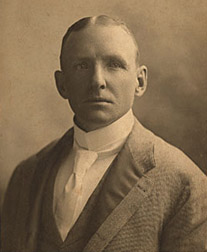
Back كاب أنسون Arabic كاب انسون ARZ Cap Anson Czech Cap Anson Spanish Cap Anson French Cap Anson Italian キャップ・アンソン Japanese 캡 앤슨 Korean Cap Anson Dutch Cap Anson Polish
| Cap Anson | |
|---|---|
 | |
| First baseman | |
| Born: April 17, 1852 Marshalltown, Iowa, U.S. | |
| Died: April 14, 1922 (aged 69) Chicago, Illinois, U.S. | |
Batted: Right Threw: Right | |
| MLB debut | |
| May 6, 1871, for the Rockford Forest Citys | |
| Last MLB appearance | |
| October 3, 1897, for the Chicago Colts | |
| MLB statistics | |
| Batting average | .334 |
| Hits | 2,995–3,435 |
| Home runs | 97 |
| Runs batted in | 2,075 |
| Managerial record | 1,295–947 |
| Winning % | .578 |
| Stats at Baseball Reference | |
| Managerial record at Baseball Reference | |
| Teams | |
As player
As manager | |
| Career highlights and awards | |
| |
| Member of the National | |
| Induction | 1939 |
| Election method | Old-Timers Committee |
Adrian Constantine Anson (April 17, 1852 – April 14, 1922), nicknamed "Cap" (for "Captain"), "Pop", and "Baby" (early in his career) was an American Major League Baseball (MLB) first baseman. Including his time in the National Association (NA), he played a record 27 consecutive seasons.[1] Anson was regarded as one of the greatest players of his era and one of the first superstars of the game.[2] He spent most of his career with the Chicago Cubs franchise (then known as the "White Stockings" and later the "Colts"), serving as the club's manager, first baseman and, later in his tenure, minority owner. He led the team to six National League pennants in the 1880s. Anson was one of baseball's first great hitters, and probably the first to tally over 3,000 career hits. In addition to being a star player, he innovated managerial tactics such as signals between players and the rotation of pitchers.[3]
Anson played a role in establishing the racial segregation in professional baseball that persisted until the late 1940s.[4][5] On several occasions, Anson refused to take the field when the opposing roster included black players.[6] His demands may have been cited as representative of player attitudes by team owners of the International League (top tier of the minor leagues) when they voted on July 14, 1887 to ban the signing of new contracts with black players.[7][8]
After retiring as a player and leaving the Colts, Anson briefly managed the New York Giants. He ran several enterprises in Chicago, including opening a billiards and bowling hall and running a semi-professional baseball team he dubbed "Anson's Colts". Anson also toured extensively on the vaudeville circuit, performing monologues and songs. Many of his business ventures failed. As a result, Anson lost his ownership stake in the Colts (by then known as the Cubs) and filed for bankruptcy. Anson was inducted into the National Baseball Hall of Fame in 1939.
- ^ "Most Seasons Played". Baseball-Reference.com. Retrieved November 22, 2006. (Note that Nolan Ryan's 27 seasons are not consecutive.)
- ^ Fleitz, David L. "Cap Anson". Society for American Baseball Research Baseball Biography Project. Archived from the original on January 7, 2012. Retrieved January 22, 2008.
- ^ Pietrusza, David; Matthew Silverman; Gershman, Michael (2000). Baseball: The Biographical Encyclopedia. New York: Total Sports. pp. 29–31. ISBN 1-892129-34-5.
- ^ Kevin B. Blackistone (December 2, 2015). "It's time for baseball to own Cap Anson's role in erecting a color barrier". The Washington Post. Washington, D.C. ISSN 0190-8286. OCLC 1330888409.
- ^ Achorn, Edward (2013). The summer of beer and whiskey : how brewers, barkeeps, rowdies, immigrants, and a wild pennant fight made baseball America's game. New York. ISBN 978-1-61039-260-0. OCLC 811598827.
{{cite book}}: CS1 maint: location missing publisher (link) - ^ Moses Fleetwood Walker is generally considered the first African-American to play in Major Leagues, in 1884 for Toledo in the then-major American Association, although the first black player is now considered to be a recently discovered one, William Edward White, who played in a single game in 1879 in the National League and who apparently passed for being white.
- ^ Hoffman, Benjamin (December 6, 2021). "He Was a Black Star 60 Years Before Jackie". New York Times. Retrieved December 6, 2021.
- ^ Rosenberg, Howard W. (2006). Cap Anson 4: Bigger Than Babe Ruth: Captain Anson of Chicago. Tile Books. p. 560. ISBN 978-0-9725574-3-6., p. 443 and Rosenberg. "Fantasy Baseball: The Momentous Drawing of the Sport's 19th-Century 'Color Line' is still Tripping up History Writers"., The Atavist, June 14, 2016. By a 6-to-4 vote, on July 14, 1887, the International League’s entirely white teams voted in favor of the ban and those with at least one black player voted in the negative. The Binghamton, N.Y., team, which had just released its two black players, voted with the majority. Right after the vote, the sports weekly Sporting Life stated, “Several representatives declared that many of the best players in the league are anxious to leave on account of the colored element, and the board finally directed Secretary [C.D.] White to approve of no more contracts with colored men.”